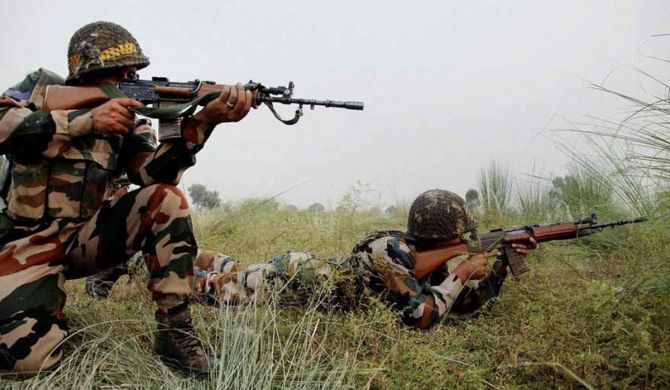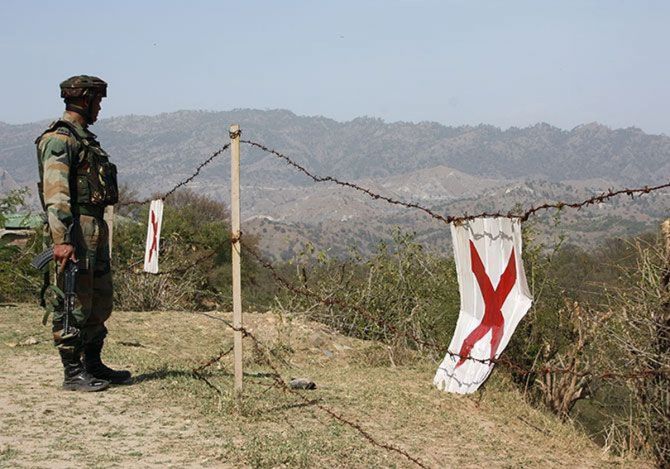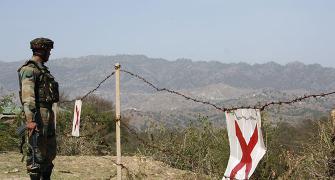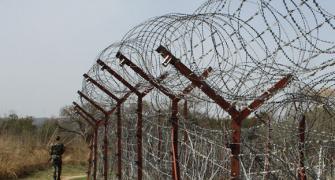An agreement between India and Pakistan, however tenuous, has its own meaning and impact.
We have not heard the last word about the ceasefire agreement, notes Ambassador T P Sreenivasan.

Winds of change have begun to blow in different parts of the world in the end of February 2021, with some potential for major changes in the future.
Chinese troops have agreed to mutual withdrawal in the Pangong sector in Ladakh without any particular gain.
President Joe Biden launched his first attack abroad, against Iranian supported areas in Syria, justifying it as a warning to Iran.
In a delicate balancing act, he has imposed sanctions on certain individuals in Saudi Arabia for the gruesome murder of Jamal Khashoggi, without personally hurting the mastermind.
And, surprises of surprises, India and Pakistan have pledged to honour the 2003 cease fire agreement without any apparent provocation.
It looked more like formalising a de facto situation as the tension on the Line of Control had come down in recent months.
It was projected as a decision by the two directors general of military operations, but it was obviously negotiated at much higher levels through back channels.
The wording of the announcement reveals that the decision has more to it than meets the eye.
'We have reviewed the situation along the Line of Control and all other sectors in a free, frank and cordial atmosphere. Both sides agreed for strict observance of all agreements, understandings and cease firing along the Line of Control and all other sectors with effect from midnight 24/25 Feb 2021.'
Some straws in the wind were noticed in recent days.
Moeed Yusuf, the adviser on national security and strategic policy planning to the prime minister of Pakistan had indicated in an interview to an Indian journalist that the Pakistan government had received some indication that there was a desire on the part of India to have talks with Pakistan.
The army chief of Pakistan had uncharacteristically talked about the need for ['mutual respect and peaceful co-existence.'
At the virtual meeting of SAARC, held to discuss the COVID-19 situation, the Pakistan representative did not raise the Kashmir issue, in a departure from usual practice.
As a special gesture, India gave permission for Prime Minister Imran Khan to fly over India to Sri Lanka, though such courtesies were denied by Pakistan to the Indian prime minister in recent months.
However, Imran Khan did not reciprocate by being less strident on Kashmir.
He mentioned Kashmir many times, provoking a comment that he was more aggressive on this matter than his army chief.
All these may not add up to much in other situations, but these are significant in India-Pakistan relations close to the second anniversary of the Balakot strike, which India had justified at the UN as a pre-emptive strike.
Balakot was seen as a decisive factor in the re-election of Narendra Modi.
It also marked the end of Narendra Modi's peace offensive with Pakistan, which had begun on the day of his swearing in.
The revocation of Article 370 and the changes in Jammu and Kashmir appeared to end the possibility of a dialogue of any kind and terrorist activities continued.
The alacrity with which the United States welcomed the restoration of the ceasefire along the LoC may have been coincidental, but since the world is watching every move by the Biden administration, this could also be seen in that context.
This is the time when the Biden effect may be detected even where it may not exist.
The withdrawal of Chinese troops from one sector and its readiness to continue the disengagement in other sectors are also being attributed to Biden.
India's concern about simultaneous confrontation on two fronts may also have acted as a catalyst.

The big question is whether these swallows do make a summer.
Probably not. There is no evidence of any change of heart on the side of Pakistan on their core issues, Kashmir and terrorism.
Even when the discussion on the ceasefire was in progress, Imran Khan was setting conditions for normalising relations with India in his conversations with the Sri Lankan leaders.
With Biden in position, Imran Khan may be even more vehement about the 'human rights' situation in Kashmir.
His security adviser was harping on all the old issues in an interview with Karan Thapar.
He kept justifying Pakistan's to take any action against the guilty in Mumbai and denial of consular access to retired naval commander Kulbhushan Yadav.
There was no sign of any inclination to start a new peace process through dialogue, though he acknowledged that India had conveyed an interest in starting a conversation.
He also spoke strongly about the unilateral changes India brought about in a disputed territory.
He really had no new ideas for the way ahead.
On the Indian side, the established policy of no talks till terrorism ends had been violated many times, hoping for some progress towards peace, but Modi, after trying various ways to reduce tension, had settled down to a 'no talk, no SAARC' position in his second term.
On SAARC, he tried to break the ice at the time of the COVID-19 outbreak, but Pakistan did not rise to the occasion.
The so-called indication that India is supposed to have conveyed that it was ready for a conversation may be wishful thinking on the Pakistan side.
The traditional cautious optimism is being expressed in all circles, not knowing what the background of the development was.
But Imran Khan's statement puts the onus of creating an enabling environment for further progress on India.
'India must take necessary steps to meet the long standing demand and right of Kashmiri people to self determination according to UNSC resolutions,' he said, moving back several steps from the hope of sustainable peace.
Once India points out that the principle of self-determination applies only to territories under colonial or foreign occupation, the UNSC resolutions are outdated and the only way forward is the end to cross border terrorism, the situation will be back to square one.
But an agreement between India and Pakistan, however tenuous, has its own meaning and impact.
We have not heard the last word about the ceasefire agreement.
Ambassador T P Sreenivasan (IFS 1967) is a former Ambassador of India and Governor for India of the IAEA.
A frequent contributor to Rediff.com, you can read his fascinating columns here.
Feature Presentation: Aslam Hunani/Rediff.com









